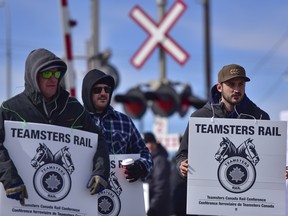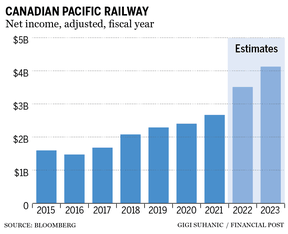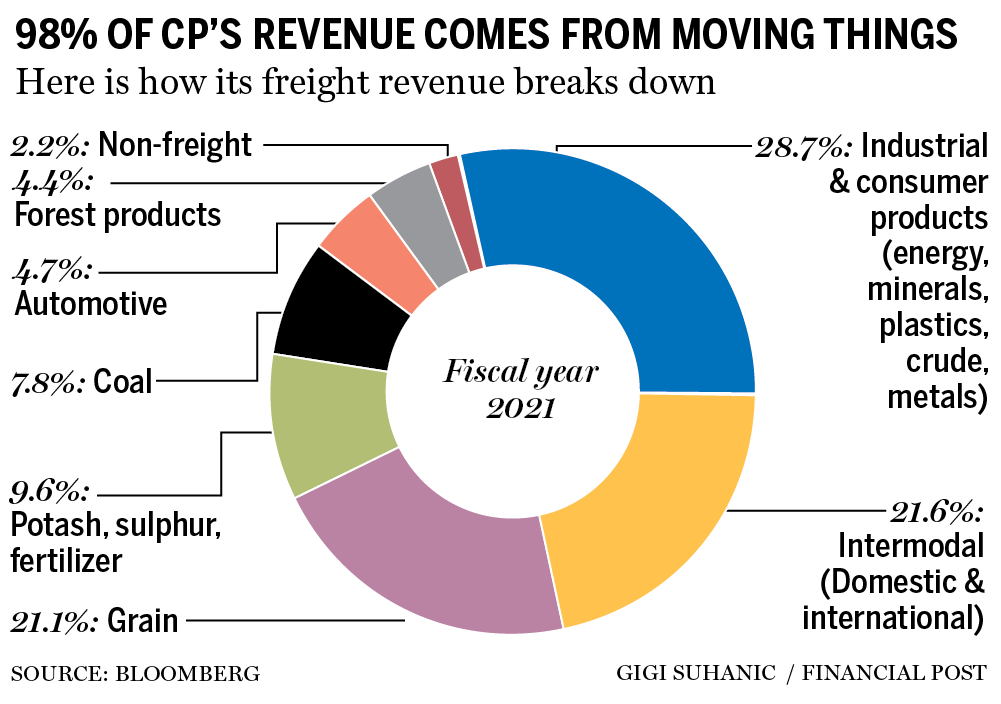Canadian fertilizer manufacturers and farmers say the railway work stoppage comes at the worst time

Article content
Farmers are calling the Co-Op store in Neepawa, Man., maybe a dozen of them a day, asking if the shutdown on the Canadian Pacific Railway will make it harder to get fertilizer this spring.
Advertisement 2
Article content
“Everybody’s worried,” said Robert Melnyk, who manages the division that caters to farmers at the Neepawa-Gladstone Co-Op.
When farmers call, all he can tell them is that he hopes the terminals — the large warehouses that offload fertilizer from trains and store it — will have enough to go around. But if the labour dispute between CP and its union continues to halt all traffic on the second-largest rail network in the country, supply could start to get tight.
“If that happens, then we’re going to be allocating and limiting how many tons the growers can pick up each day,” he said.
The fertilizer concerns are part of a growing list of potential ripple effects from the CP shutdown, which stretched into a second consecutive day on March 21 as negotiators with CP and Teamsters Canada continued talks with federal mediators in Calgary. Both sides have argued publicly about who started the crisis, with the union calling the situation a lockout, while CP insists Teamsters went on strike first.
Advertisement 3
Article content
Advocates for Canada’s agriculture, energy, mining, and automotive sectors are all warning that a stoppage along CP’s lines will have impacts across the pandemic-battered North American supply chain. On farms, the situation threatens to stem the flow of crucial inputs like fertilizer and pesticides to some regions, which could reduce crop yields at a time when global grain supplies are already challenged by the Russian invasion of Ukraine.
It’s terrible timing
Matt Conacher
“It’s terrible timing,” said Matt Conacher, the senior fertilizer manager at Federated Cooperatives Ltd. (FCL), a wholesaler that buys product for 160 local co-op stores that serve farmers across Western Canada. “We rely quite heavily on CP.”
FCL orders fertilizer from domestic and international manufacturers, which is then shipped to terminals across the prairies. Two of FCL’s three terminals are supplied by CP trains. FCL could supplement some of the lost rail traffic by using more trucks, but Conacher said truck capacity is tightened due to labour shortages and heightened demand, and rates are “astronomically high.”
Advertisement 4
Article content
The federal government has so far resisted mounting calls to end the shutdown with back-to-work legislation, arguing that “the best deals are reached at the table.”
“We have faith in their ability to reach an agreement. Canadians expect them to do that ASAP,” Labour Minister Seamus O’Regan’s office said in an email.
Teamsters Canada Rail Conference, which represents roughly 3,000 engineers, conducts, train and yard workers, didn’t respond to calls on Monday, but the union’s Twitter account posted a cartoon showing a businessman perched on a mountain of money, accusing a worker of being greedy for requesting a raise to their pension cap. The two sides are reportedly at odds over pensions, wages and rules around work schedules.
Advertisement 5
Article content

CP’s net income was $2.9 billion in 2021, up from $2.4 billion the previous year, according to the company’s most recent earnings update. Annual revenues increased by four per cent to $8 billion.
The railway said it pays TCRC locomotive engineers an average annual salary of $135,442, and that the average pay of its conductors, yard workers and train workers is $107,872.
CP is also in the final stages of its plan to build the first rail network linking the U.S., Mexico and Canada. In December, CP’s US$31-billion acquisition of the Kansas City Southern (KCS) rail line closed into a voting trust. The company is now awaiting a decision later this year from the U.S. Surface Transportation Board on whether it can take control of the KCS network.
Advertisement 6
Article content
 Negotiators didn’t reach an agreement before a 12:01 a.m. lockout deadline on Sunday, which CP initiated last week. Teamsters put out a release about 15 minutes before the deadline, blaming CP for locking out the union and putting the Canadian supply chain at risk.
Negotiators didn’t reach an agreement before a 12:01 a.m. lockout deadline on Sunday, which CP initiated last week. Teamsters put out a release about 15 minutes before the deadline, blaming CP for locking out the union and putting the Canadian supply chain at risk.
“Canadian Pacific management must be taken to task for this situation,” spokesperson Dave Fulton said in the release.
But CP accused TCRC of “withdrawing services” — which essentially means workers stopped working — before the midnight deadline. After that, CP shut down its operations, CP spokesperson Salem Woodrow said.
-

CP Rail shutdown to add to commodities supply shock sparked by Ukraine war
-

Labour minister urges quick end to railway work stoppage
-

CP Rail shutdown begins across the country as labour talks continue
Advertisement 7
Article content
“CP did not lock out its employees,” she said, adding that “CP made an offer and was sitting at the table waiting for a response” when TCRC issued its news release about a lockout.
In Neepawa, Man., farmers don’t often have the space to store a whole spring’s worth of fertilizer. So Melnk, at the Co-Op store, expects many to start coming to pick up their orders in April and May as needed, sometimes making daily trips. He estimated that about 50-60 per cent of the fertilizer his clients need for the season has already bee shipped to farms. But to be able to fill those orders, he needs the terminals to keep sending product.
“It definitely has us concerned,” he said.
• Email: jedmiston@nationalpost.com | Twitter: jakeedmiston


